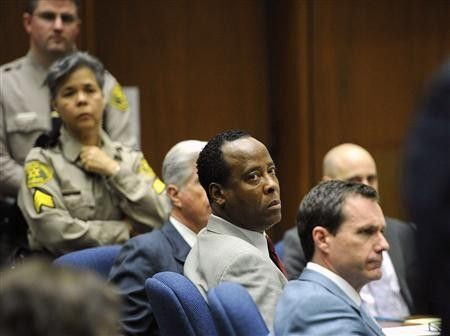Conrad Murray Guilty: Was Involuntary Manslaughter Conviction Justified?

On Monday, a jury found Conrad Murray guilty of involuntary manslaughter in connection with Michael Jackson's death in 2009. Dr. Murray was remanded into custody without bail, where he will await his sentencing on Nov. 29.
He is now a convicted felon and has been deemed the causative factor of Michael Jackson's death, Judge Michael Pastor said in support of his decision to remand Murray, citing the need to protect the public. This is not a crime involving a mistake of judgment. ... This was a crime where the end result was the death of a human being.
Upon leaving the courtroom, Jackson's mother Katherine made a brief statement to reporters. Justice was served, she said before getting into an awaiting car.
I am not surprised by the verdict, Thomas W. Mitchell, a litigator with extensive trial experience in medical malpractice, told IBTimes.
In Mitchell's view, based on what he knows of the case, Murray neglected to provide adequate safeguards for his patient. Jackson was determined to have taken a fatal dose of propofol, a drug that is typically administered in a hospital setting where measures to address a possible overdose or adverse reaction are within arm's reach.
Since he was prescribing propofol for Mr. Jackson, Mitchell said, Dr. Murray was supposed to have medications on hand that could immediately reverse the effects of that drug. Still, Dr. Murray was likely within his rights in possessing and prescribing propofol to Jackson.
Existing guidelines for drug dispensing cannot prevent a doctor from obtaining and prescribing these types of drugs for a patient, Mitchell said. The doctor just needs to justify his prescription, which is easy to do.
But any doctor prescribing a drug to a patient must be aware of any potential for a negative interaction. As Mr. Jackson's personal physician, Dr. Murray not only had the duty to know what medications his patient was taking, but he was in the unique position to know it on a daily basis, Mitchell told IBTimes. He is not supposed to rely on discussions with the patient, but should also communicate with other doctors whose care he coordinated, the medical records he had access to, and the pharmacies that filled his patient's prescriptions.
In the police interrogation following Jackson's death, Murray insisted that that he was not aware of any other medications Jackson was taking, adding that he had heard the pop star visited another doctor three times a week.
After being told by police that drugs other than those Murray was prescribing were found in Jackson's home, he said, Surprise, surprise.
In a post-verdict press conference, District Attorney Steve Cooley said that the conviction of involuntary manslaughter carries with it an automatic suspension of [Murray's] medical license in the state of California. I would hope that other states would honor California's conviction, Cooley added.
Mitchell told IBTimes that some, but not all, U.S. states would honor the conviction due to a reciprocity agreement. It is not completely out of the question that Murray could in the future apply for a medical license in a state that does not have a reciprocity agreement with California, and that state would make a determination based on a review of his application.
Murray will first have to serve out his sentence -- which may not be substantial. He faces a maximum sentence of four years, and that sentence could be cut in half as an indirect result of a recently enacted California law that prevents nonviolent criminals from going to state prison. Murray will instead serve his sentence in a county jail, and could be expected to serve only two years of a maximum four-year sentence due to overcrowding.
But Murray can also be expected to face civil charges, in Mitchell's opinion.
Classically, the personal representative of Mr. Jackson's estate would have a wrongful death claim brought on behalf of Mr. Jackson's beneficiaries, Mitchell told IBTimes. There is a California statute that lays out what who the beneficiaries are and what damages are recoverable.
A civil case would address the question of whether or not Murray breached the standard of care in Jackson's treatment, which would find him responsible for a wrongful death as a result of medical malpractice. Mitchell said he believed that such a breach is largely implied by the involuntary manslaughter conviction.
Also, the burden of proof is less in a civil case than it is in a criminal case: the jury would be instructed to weigh the preponderance of evidence rather than determine beyond a reasonable doubt that Murray is responsible for Jackson's wrongful death. To measure it in quantitative terms, the jury must determine that 51 percent of the evidence supports a wrongful death claim in order to find Dr. Murray responsible for damages -- both economic and non-economic (i.e. pain and suffering).
The cap for non-economic damages in a wrongful death suit is $250,000, Mitchell explained. But economic damages from a wrongful death claim could be very significant, as future earnings -- such as ticket sales from the This is It concert tour Jackson was rehearsing for when he died -- are considered in such claims. There is no cap on economic damages from wrongful death claims in California.
Typically the big dollars would come from economic damages, Mitchell said. I would imagine [Jackson] had substantial income potential.
© Copyright IBTimes 2024. All rights reserved.






















